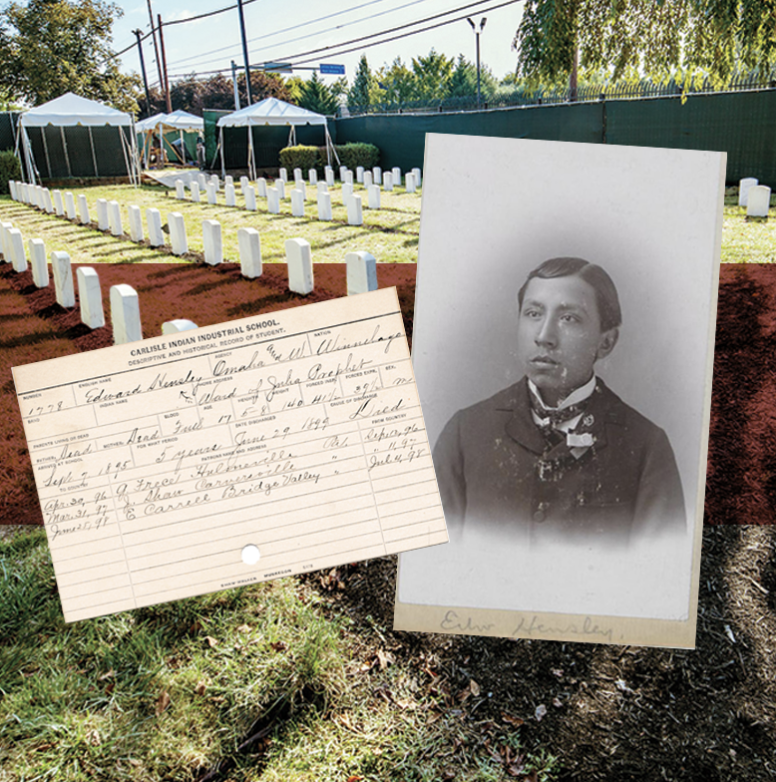
- Details
- By Native News Online Staff
The U.S. Court of Appeals for the Fourth Circuit is set to hear arguments on Wednesday, September 10, in Winnebago Tribe of Nebraska v. United States Department of the Army (No. 24-2081), a case that could have significant implications for the enforcement of the Native American Graves Protection and Repatriation Act (NAGPRA).
At the center of the case is the Winnebago Tribe of Nebraska’s effort to secure the return of the remains of two children—Samuel Gilbert and Edward Hensley—who were taken from their community and sent to the Carlisle Indian Industrial School in Pennsylvania. Both boys died during their time at Carlisle, a federal boarding school that was part of a broader government campaign of forced assimilation of Native children in the late 19th and early 20th centuries.
The Tribe argues that it has fulfilled the legal requirements under NAGPRA to establish cultural affiliation with Samuel and Edward, and that the U.S. Army, which oversees the Carlisle Barracks where the children’s remains are currently buried, is unlawfully withholding them in violation of federal law. The case seeks to overturn a prior decision from the U.S. District Court for the Eastern District of Virginia, which dismissed the Tribe’s claims.
Passed in 1990, NAGPRA requires federal agencies and museums to repatriate Native American human remains and cultural items to affiliated Tribal Nations. Central to this appeal is the question of whether a federal agency must comply with a Tribal Nation’s repatriation request once the Tribe has met NAGPRA’s standards for proving cultural affiliation.
If the appeals court determines that NAGPRA applies in this case, the Army would be legally obligated to repatriate the remains of Samuel and Edward to the Winnebago Tribe in an expeditious and culturally appropriate manner, in keeping with the statute’s requirements and the principles of a government-to-government relationship.
The Winnebago Tribe is represented in the case by its general counsel, Danelle Smith of Big Fire Law & Policy Group LLP, along with attorneys from the Native American Rights Fund and Cultural Heritage Partners, PLLC.
The panel of judges assigned to hear the appeal will come from the Fourth Circuit’s Panel III and are expected to be announced on the morning of oral argument.
To learn more about Samuel Gilbert and Edward Hensley and Winnebago’s fight for their repatriation, visit the Winnebago v. U.S. Army case page.
WHEN: 9:30 a.m. (Eastern) on Wednesday, September 10, 2025 (second day of the court’s September session)
WHERE: U.S. Court of Appeals for the Fourth Circuit, Blue Courtroom (Room 339), Lewis F. Powell Jr. U.S. Courthouse, 1000 East Main Street, Richmond, VA | Live video: https://youtube.com/live/
More Stories Like This
Committee Advances 20% Increase to Navajo Child Support GuidelinesNavajo Committee Advances $84M Transportation Improvement Plan
NCAI Passes Two Emergency Resolutions on Immigration Enforcement Activities
Chickasaw Lighthorse Police Officer named Indian Country Law Enforcement Officer of the Year
Indian Gaming Association Rallies Broad Coalition Against Sports Event Contracts It Calls Illegal Threat to Tribal Sovereignty
Help us defend tribal sovereignty.
At Native News Online, our mission is rooted in telling the stories that strengthen sovereignty and uplift Indigenous voices — not just at year’s end, but every single day.
Because of your generosity last year, we were able to keep our reporters on the ground in tribal communities, at national gatherings and in the halls of Congress — covering the issues that matter most to Indian Country: sovereignty, culture, education, health and economic opportunity.
That support sustained us through a tough year in 2025. Now, as we look to the year ahead, we need your help right now to ensure warrior journalism remains strong — reporting that defends tribal sovereignty, amplifies Native truth, and holds power accountable.
 The stakes couldn't be higher. Your support keeps Native voices heard, Native stories told and Native sovereignty defended.
The stakes couldn't be higher. Your support keeps Native voices heard, Native stories told and Native sovereignty defended.
Stand with Warrior Journalism today.
Levi Rickert (Potawatomi), Editor & Publisher


